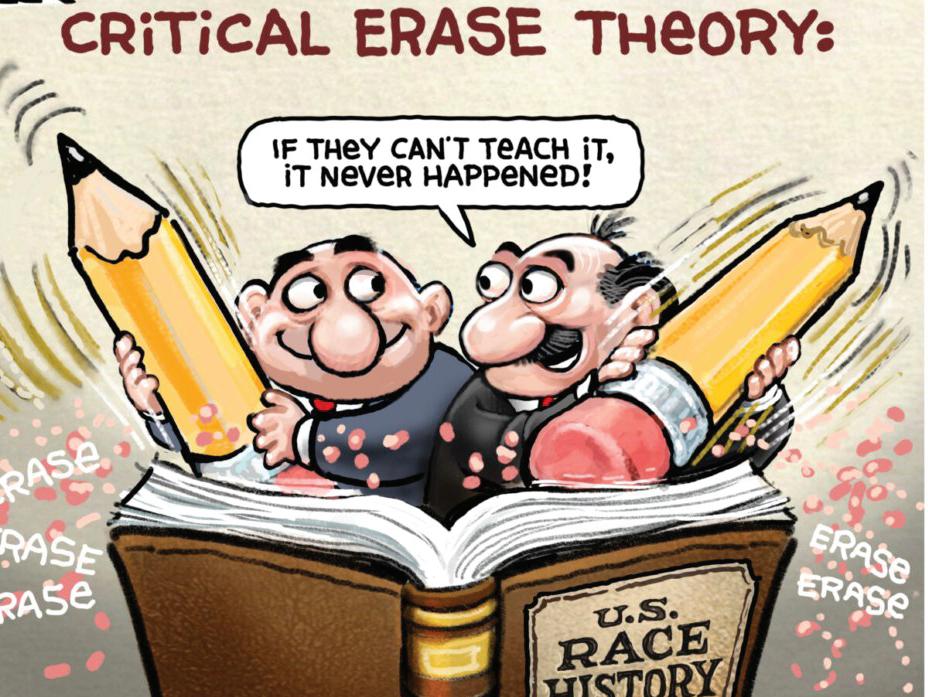
10 minute read
What’s the Big Fuss About Critical Race Theory?
Anthony S. Lewis, Ph. D
As school districts around the country begin another school year, the health and safety of staff and students are still top of mind as we continue to navigate these unprecedented times as a result of COVID-19 and the momentum-gaining Delta variant. As I look out my office window, I see onlookers in traffic yelling at the anti-mask protesters assembled near our school district sign. The ongoing debates of should kids be in school or not, should kids wear masks or not, and now, is Critical Race Theory (CRT) taught in schools have taken over the job responsibilities of school superintendents and school boards across the country. As a black male superintendent in a red state, I have to wonder, why is the latter receiving so much attention?
Critical Race Theory is not a new concept. It originated over four decades ago and attempts to explain why racial disparities exist in our country. CRT acknowledges that race is a social construct and argues we are not different species. CRT also attempts to understand the connections between race and social inequality, as there are inequalities in our country based on race. Some anti-CRT folks have connected diversity, equity, inclusion, social justice, anti-racism, or anything related to race to the term “critical race theory”, and they simply do not want to acknowledge that racial inequalities exist.
As an educator, having worked in three school districts in three states, I have witnessed how the results of these inequalities play out in our school systems. Some would argue that some students simply do not work hard enough, do not apply themselves, are not as smart, or are naturally inferior. Many believe that achievement gap explanations are connected to external problems and are not the responsibility of educators. Some SCLC National Magazine/ Fall 2021 Issue 35
of these external factors expressed are that some children of color are genetically less intelligent, that the cultures of the children and parents do not value or support education, and that the child does not come to school ready to learn with skills and attitudes needed to succeed. Others agree or dispute the genetics argument that genetics is the cause of differences in educational achievement. The overwhelming, inarguable conclusion of thousands of scientists all over the world is that this belief is false.
In contrast, scholars of critical race theory would argue that our social systems have been designed in ways that unfairly disadvantage some groups and unfairly advantages others. For example, we try to refrain from terms like “achievement gap” as it unfairly places blame on kids. This term also refers to the fact that the arbitrary circumstances in which people are born—such as their race, ethnicity, ZIP code, and socioeconomic status—determine their opportunities in life, rather than all people having the chance to achieve to the best of their potential. Instead, we use terms like “opportunity gap” as it draws attention to the conditions and obstacles that young students face throughout their educational careers. It therefore accurately places responsibility on an inequitable system that is not providing the opportunities for all kids to thrive and succeed. Opportunity gap implies that, when given the resources and opportunities they deserve, all kids can achieve. And most importantly, it does not place responsibility on kids for systemic injustices (Mooney, 2018).
So, why is CRT a major topic today? As we begin to ponder this question, make no mistake, there is an organized movement to stop racial progress in our country. Think back to the killing of George Floyd and the Black Lives Matter movement began to gain momentum. We also cannot overlook the election of President Joe Biden and the historical day, January 6, 2021. Many witnessed before their very eyes the potential toppling of white supremacy in the south, a black preacher, Raphael Warnock, who pastors Dr. Martin Luther King Jr’s church in Atlanta and a Jewish man – Jon Ossoff was elected in the south, representing Old Dixie (Georgia). To have representation from two marginalized groups, ascend themselves to the helm of power was incomprehensible for some. Two Senate seats were acquired. While that was great progress and we were all very optimistic, we heard

rumors that former President Trump sends a white supremacist SOS to the proud boys to tell them to “stand back and to stand by” and the United States Capital building was attacked by rioters. We also cannot overlook the popularity of the Pulitzer Prize-winning 1619 Project, spearheaded by New York Times journalist Nikole Hannah-Jones, which centers the role of the institution of slavery in the formation of the United States. In education, this backlash has manifested in efforts to ban the teaching of anything related to race, racism, or any other social issues, which some folks have inaccurately lumped together under the banner of “critical race theory.” These efforts are happening at the local level as angry parents and community members flood school board meetings and at the state level where identical, Republican-sponsored bills are being proposed to ban the teaching of “critical race theory” in coordinated ways across the country (Griffin, 2021).
School systems should address this topic head-on. This is not a time for timid leadership if you are truly serious about transformational change. Our local school board recently (May 2021) passed an Equity Policy that states:
Current and past federal, state, and local failures to act urgently in the pursuit of educational equity contribute to reduced access to academic opportunities, and disparities in graduation outcomes and disciplinary actions for students from historically marginalized communities.
To disrupt systemic racism and other forms of injustice that profoundly impact students’ current and future quality of life, the board commits to advancing educational equity by applying a systemic change framework to school governance and resource allocation. The board, district administrators, certified and classified staff will work together to aggressively and efficiently eliminate inequitable practices, systems, and structures that create advantages for some students and families while disadvantaging others. School employee behaviors shall contribute to a school district where students' educational outcomes cannot be predicted by race, socioeconomic status, and/or other historically marginalized identities; and where all students and staff are engaged in a positive and academically rigorous environment where educational equity is woven into every single department or division.

As we continue this work, educators need to continue the messages that pre-date the CRT recent movement. As school systems, we are about serving all kids; giving them the tools to prepare them to live in a diverse world; ensuring every student is treated fairly; empowering all students to take action to make the world a better place; making sure all students see themselves and people like them reflected in what they learn at school; making sure everyone has an equal opportunity to succeed; teaching our students accurate information about our history, and helping students learn about all kinds of people so that they can work and build connections with people from all over the world. We have smart students who are critical thinkers who will one day become voters. Maybe this is what the anti-Critical Race Theory folks are worried about.
Mooney, T. (2018, May 11). Why We Say “Opportunity Gap” Instead of “Achievement Gap.” https://www.teachforamerica.org/one-day/top-issues/why-we-say-opportunity-gapinstead-of-achievement-gap.
Griffin, S. R. (2021, June 6). What do education leaders need to know about the critical race theory debate? https://www.justiceleaderscollaborative.com/.


Dr. Anthony Lewis is the Superintendent of Schools for the Lawrence Public Schools System in Lawrence, KS. In addition, he is the co-author of It Was A Dream: If You Can Dream It, You Can Make It Happen as well as the co-founder of TDI (Turning Dreams Into Realtes), Inc.
ATLANTA TECHNICAL COLLEGE is proud to be a 2021 supporter of the Southern Christian Leadership Conference and honor the legacy of Dr. Martin Luther King, Jr.
What makes us better than a bank? It’s not just what we have, it’s what we don’t have. We don’t have in ated interest rates. We’re not run by WallStreet or pro t-hungry stockholders. We are not-for-pro t and dedicated to giving back to the community. We put our members rst. And with better rates and service, there’s no reason not to switch. am rst.org
YouFirst











ALABAMA EDUCATION ASSOCIATION Like Rev. king and the SCLC,
we fight foR betteR futuReS foR aLL peopLe.





Design and layout by SdotArtists Management


#Dadication





On February 14, 1957 a group of pastors and leaders, gathered under the leadership of Dr. Martin Luther King, Jr. to form an organization to bring nonviolent direct action to empower and bring freedom to Black Americans under the umbrella of the Southern Christian Leadership Conference.
April 4, 1968, a tragic day, when an assassin ’ s bullet took the life of Dr. King. But it did not take the life out his movement, instead it provided the spark that brought light to his life ’ s work on nonviolent direct action and change.
The Love and Light Campaign supports the history, the work and the future of the SCLC. As you join, you help us continue to fulfill our mission of “Redeeming the Soul of America!”
Please head to http://nationalsclc.org/lal for more information






POWER THAT MOVES
The Southern Christian Leadership Conference has lived out the spirit of Dr. Martin Luther King, Jr. since its founding by educating communities on advocacy, personal responsibility, civil rights, and liberty for all. As the energy industry continues to change, Alabama Power strives to create an inclusive workplace that is as diverse as the communities we serve. We are committed to fostering an equitable environment in all areas of our company, from our leadership development programs to our charitable foundations. Alabama Power is honored to partner with SCLC to continue achieving social, political, and economic justice.




















